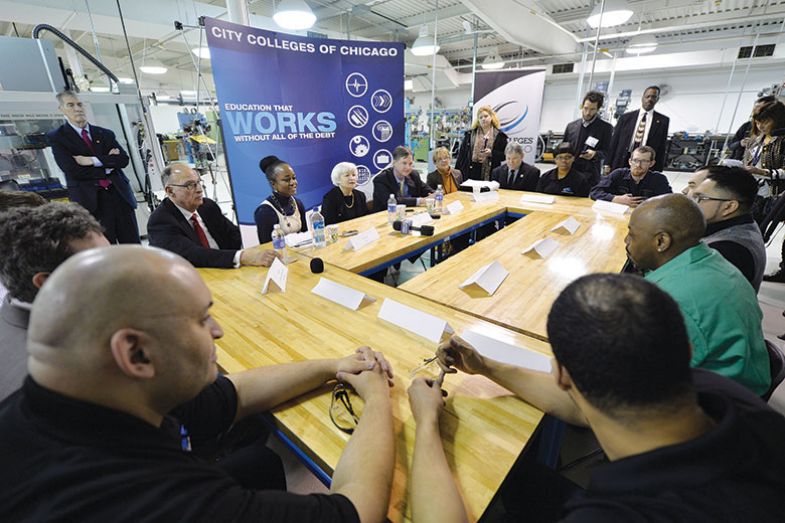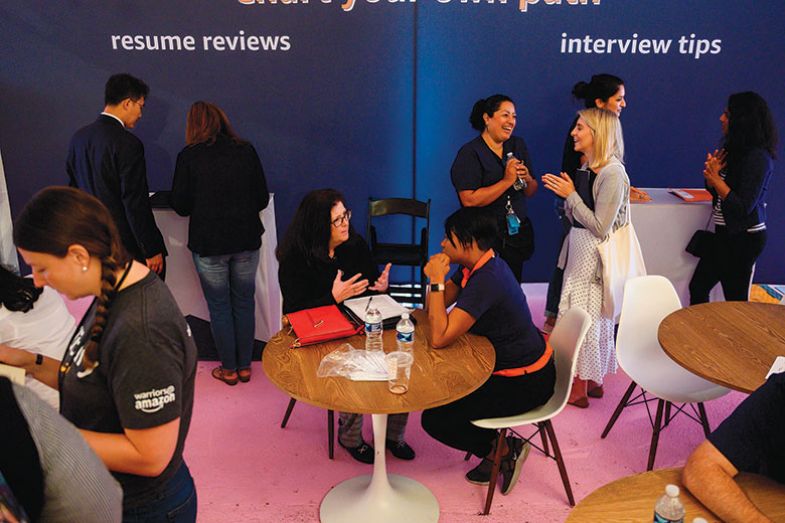Pressured by her family to pursue medical school, Diana Choi found herself managing a Chipotle fast-food restaurant after sticking with her course at the University of California for less than a semester: “I don’t think I really wanted to go in the first place,” she admits.
But now the twentysomething is better off than most people her age, with a full-time job at the software development company Techtonic – which, for no charge, gave her better training than her friends claim to have obtained in college.
“It’s pretty amazing,” Choi says of Techtonic, where three months of classroom work and nine months of on-the-job training lead to software engineering jobs that can start at $75,000 (£57,000) a year. “When I first heard [about the programme] I thought it was too good to be true…to get an education while getting paid to go.”

The US private sector, backed by conservative political allies, has long argued that it could bring a lot of needed improvement to post-secondary education. And Choi’s experience illustrates one of its chief arguments: the idea that many US high-school graduates can be trained to fill the large unmet demands of the nation’s high-tech workplace without the time and ever-escalating expense of a four-year, or even two-year, college degree.
“Big companies have decided to really call the bluff of universities on the value of their degrees,” says Jim Hutcherson, a principal at Capgemini, a software development company that also has begun training its own workers using a variety of strategies, including short certification courses in sales software that last a few weeks, and a more proactive targeting and training of recruits while they’re still completing their college degrees.
Choi agrees. She says that friends who sought similar training in a university setting have told her that the Techtonic curriculum “is more modern and up to date. Even though it’s only a three-month class in training, a lot is packed into that.”

It’s a smart deal for the employers too, says Ryan Craig, managing director of University Ventures, which invests in firms aiming to fill the educational gap between what colleges provide and what companies want. It is smart because it allows firms to assess potential recruits during the training process, before deciding which to “graduate” and keep on. Techtonic, for instance, has an 80 per cent graduation rate, meaning that 20 per cent of students do not end up with a job at the company, even though it accepts only 10 per cent of applicants for its course.
It’s a “try-before-you-buy model for employers”, Craig says. “These models are growing very, very quickly.”
Others view the developments more cautiously. It’s true, says Steven Brint, a professor of sociology and public policy at the University of California, Riverside, that many companies are unhappy with the adaptability of colleges and with the job-readiness of their recruits. But employers are still more likely to want to recruit job candidates who bring basic literacy and numerical skills than to try teaching such abilities themselves, he says. As for the idea that US companies will become major trainers of their own workforces, Brint says: “It’s one of those things where I’ll believe it when I see it.”
It is easy to be sceptical. As measured by its public-facing rhetoric, the US business community is actually full of admiration for a classical liberal arts college education, regularly crediting colleges with creating graduates with the adaptability and communications skills critical to fast-changing marketplaces. Indeed, Amazon’s decision to locate part of its new corporate headquarters in Virginia was likely motivated at least in part by the state’s commitment to invest up to $375 million (£280 million) in its public higher education system, including establishing a new School of Computing at George Mason University, providing the company with a ready supply of highly skilled potential recruits.
That recognition of the value of traditional degrees is also seen in surveys such as a 2018 poll by the Association of American Colleges and Universities that found overwhelming confidence among business executives and hiring managers in US colleges and their graduates.
Perhaps that also explains why, for several decades, the private sector in the US and elsewhere has cut back in-house training schemes for workers – although another reason, no doubt, is a financial preference for workers to acquire the relevant qualifications at the public’s and their own expense.
Moreover, firms’ aversion to taxation has seen them lobby for the balance of the cost to be tipped ever more towards the individual. Corporate-funded lobby groups such as the American Legislative Exchange Council have pushed the decades-long slide in public support for higher education; so much so that F. King Alexander, the outgoing president of Louisiana State University, is predicting that half of all US states will have ended their public support for higher education within 15 to 20 years.
To make matters worse, college costs have persistently risen faster than inflation. Student debt levels keep hitting record levels, with private for-profit colleges a leading driver.
Meanwhile, companies in key market sectors state that they can’t find enough qualified workers. There are tens of thousands of vacancies for software engineers, physician assistants and product managers, all positions that offer salaries in the range of $100,000 a year, according to the job recruiting site Glassdoor.
The need for some kind of fundamental change at the post-secondary level therefore seems clear. And more and more US firms appear to be concluding that, college or no college, they themselves need to take graduates the final mile on employability, by teaching them the specific skills they need for particular jobs in an era of rapid technological advancement.
Not all traditional education providers are resting on their laurels, however, when it comes to the future requirements of workforce training. Innovators include the City Colleges of Chicago system of seven community colleges, which has been working with 20 companies in the area to offer an alternative to a four-year university degree that combines a two-year associate’s degree with two years working as a company apprentice.

In California, the state’s community colleges have created a new unit, called Calbright College, that specialises in low-cost career training for adults. “We are training people for jobs, and we believe our model will lead to the highest hiring rates,” says Heather Hiles, Calbright's former president and CEO.
And in the Washington DC area, the Business-Higher Education Forum works with about a dozen local universities and 20 of the region’s biggest employers to create and award commonly designed digital credentials in various industry-specific skills.
They’re among numerous universities around the US and elsewhere that are involving themselves in the developing field of microcredentials: small chunks of learning, often delivered online, that can be taken as stand-alones or “stacked” into more substantial qualifications.
Moreover, for all the renewed promises of a private sector-led revolution in education, traditional colleges still hold a solid incumbency advantage. Years of data continue to show substantial gains in average lifetime earnings from any kind of traditional college degree, with estimates of $1 million or more for a four-year diploma.
But whether more focused job training is provided by colleges or firms themselves, the evident need for it flags up what some observers see as a gaping void in the whole US school-to-career structure.
A generation ago, many US high school students who lacked the ambition to pursue college had robust options in technical or vocational schools that led to well-paying careers in fields such as construction, healthcare and automotive and computer repair. But as college became a necessary credential for a growing number of occupations, “voke” schools became seen as second-place options. That stigma, along with educational segregation that filled such schools with racial minorities, led many parents and communities to shun such pathways, embracing the view that every child deserves a chance at college, whether or not it makes sense in each case.
The result, says Anthony P. Carnevale, director of Georgetown University’s Center on Education and the Workforce, is that too many students have been arriving at college without the preparation or inclination to succeed. That is leaving companies without enough trained technical workers, and driving up the worst form of student debt: that which is incurred without resulting in a college degree.
That problem, Carnevale says, is a largely hidden factor driving calls in the 2020 presidential campaign and beyond for some kind of “free college” plan. He sees the most likely policy solution – extending by two years the current assumption of free public education – as mostly aimed at helping the kinds of students that companies such as Techtonic and Capgemini are now competing to train.
By granting students two more years beyond grade 12, Carnevale says, those who probably should have enrolled in a technical or vocational programme while in high school could get that kind of training at one of the US' nearly 1,000 two-year community colleges: the “most pragmatic part of the American higher education system”, in Carnevale’s estimation.

The private sector is having the same basic thought, seeking to plug the educational gap between what colleges provide and companies want. Such programmes in a corporate setting can work for those without any college experience, those with a college degree, or those like Choi who are midway between, according to University Ventures’ Craig.
One problem is whether such programmes will be recognised by other employers. Capgemini’s Hutcherson formerly worked with Apollo Education Group, the parent company of the massive University of Phoenix for-profit institution, which delivers a range of degree and sub-degree programmes, mostly online. There, he says, he and others spent more than a decade pushing employers to recognise workplace competencies short of degrees. But a breakthrough on that front now seems imminent, with major employers – including Amazon, as well as Google – making clear in just the past year or so that they are willing to hire candidates without a college degree. That’s setting an example that many other companies will now follow, Hutcherson says.
“We’re probably a few years away from it being mainstream, but I see it really starting to pick up now,” he says.
Four years ago, Hutcherson says, nobody in his unit at Capgemini would have lacked a bachelor’s degree. Now about 5 per cent do, and that’s likely to reach near 15 per cent within about five years.
Before companies play a more substantial role in US post-secondary education, however, experts suggest that they’ll need to address questions that have limited their involvement in the past. One is whether they will stick with expensive in-house or franchised training operations if large numbers of their graduates keep taking jobs elsewhere. Another is whether their trainees will find career satisfaction without the liberal arts training that both companies and colleges have long insisted is necessary for promotion and long-term success.
On the latter question, Hutcherson and other business leaders express confidence – despite strong scepticism among liberal arts advocates in academia – that workers will absorb the necessary cultural cues once in the workplace. And even in the few months she’s been at Techtonic, Choi says she has seen young colleagues win promotions to section leads.
Hutcherson also brushes aside the retention issue, since, he says, teaching a class of 50 costs roughly the same as teaching a class of five. And of those trainees who do leave, some end up working jointly with Capgemini on projects at other companies, and some even return: “I actually had a couple people come back after they made the first jump,” Hutcherson says.
According to Carnevale, the increasing involvement of private firms in the training of their workers amounts to a US adoption of European-style apprenticeships, but with the companies rejecting European levels of employer investment and government guidance, and pursuing a much wider variety of models. “There’s a restructuring here that is profound,” says Carnevale. “The American version of the European system is coming.”
Indeed, the presence of European firms in the US means that genuinely European-style apprenticeships are also becoming part of the mix, although with some local flavours. The German industrial manufacturer Siemens, for instance, sited a major gas turbine plant in North Carolina in part because local college leaders were willing to work jointly with the firm on job training.
Another example, says Brian Fitzgerald, chief executive officer of the Business-Higher Education Forum, is the professional services company Accenture, which has about 400 apprentices at eight sites nationwide. “It’s not saving the world,” Fitzgerald says, “but it’s creating an innovative new pathway for the kinds of students who probably would not find their way to Accenture without this kind of programme.”
Ongoing experimentation is critical, Fitzgerald says. Some companies and policymakers suffer from the delusion that a single new approach is waiting to be discovered: the idea “that if we just got this one thing right, we’d…fix this economy. There’s sort of a search for the holy grail here. The real story behind it is that there is a vast world of work-based learning out there that’s going on in a variety of different forms.” The most important elements in most cases, he says, are subject-area knowledge, digital skills and business organisational abilities.

Many colleges and universities have, of course, already responded to the employability and value-for-money agendas by seeking to incorporate the teaching of generic, transferable professional skills into traditional degree programmes – perhaps with some specialist additional employability modules bolted on. But given the financial pressures many are under as demand declines and tuition costs rise ever higher above ability to pay, it may well be that a greater number of traditional colleges will have to embrace more radical innovations.
“There is undoubtedly increasing interest in how higher education relates to employment,” says Craig Lindwarm, vice-president for congressional and governmental affairs at the Association of Public and Land-grant Universities – “and that’s not something that institutions have to shy away from.”
About a dozen US colleges are expected to close annually in coming years, the credit rating agency Moody’s projects. The victims, Carnevale says, will likely include many small four-year liberal arts colleges that just can’t make the switch to emphasise training for whatever jobs are available in their areas. Colleges and universities will also be worried by a survey published last year by the Associated Press and the NORC Center for Public Affairs Research, which revealed that more than half of Americans aged between 13 and 29 see college as important to economic success, but four in 10 doubt the value of an actual bachelor’s degree, as opposed to more specific training.
In the face of such attitudes, Riverside’s Brint – who studies trends in higher education – has taken time to remind US higher education of its success. In his 2019 book, Two Cheers for Higher Education: Why American Universities are Stronger than Ever – And How to Meet the Challenges They Face, he details the fact that more than 200 US universities are thriving, globally elite institutions, producing world-class research and graduates with the emotional intelligence needed to apply it.
But that reality may only serve to highlight the problem facing all the other US colleges – especially in areas of the country where populations are declining and not being replaced by willing immigrants. Political decisions that are fuelling a continued widening of the nation’s income gap appear likely to leave a growing number of talented high school graduates looking for quicker and cheaper educational options, outside the elite universities, that move them more quickly into the labour force.
Companies such as University Ventures are among many positioning themselves for that type of future. But such trends, Craig acknowledges, do carry with them the long-term risk of promoting a workforce, society and political environment even more divided between people with broad educational exposure and those with a narrow, job-specific preparation.
“I am deeply concerned about that,” he says. “I don’t have a great answer for it, but I think that [a greater use of purely vocational training] is a more honest and less risky system economically than the one we have now.”
For all the political demands to pay more attention to the short-term imperatives of the corporate sector, traditional colleges certainly aren't giving up on their equally long-standing aspirations to help build a better society beyond the workplace. And the recent upward movement in higher education spending in some states could help them double down on that public service mission, Lindwarm believes: “We hope that as state investment picks up again, momentum can be built toward states returning to a role that they've historically filled,” he says.
That revival – if it happens – would provide the better result for most Americans, Carnevale says, even if some workers, such as Choi, feel satisfied with more focused employment training. That’s because the best long-term workplace preparation in most cases has been shown to be a mix of about two-thirds general education and one-third focus on a specific field of expertise, Carnevale says.
“You’ll find that the kid who gets the one-year certificate will win for the first 10 years, or even 20,” he says. “But the bachelor’s degree will catch up.”
POSTSCRIPT:
Print headline: Will employability make universities redundant?
Register to continue
Why register?
- Registration is free and only takes a moment
- Once registered, you can read 3 articles a month
- Sign up for our newsletter
Subscribe
Or subscribe for unlimited access to:
- Unlimited access to news, views, insights & reviews
- Digital editions
- Digital access to THE’s university and college rankings analysis
Already registered or a current subscriber?



